
Franky Perez: “What you’re listening to is the most genuine part of me that you could find.” Photo: Fab Fernandez
A songwriter inspired to write his new album as he travelled the USA on his motorcycle performing to healthcare workers
Songs are gifts. As much as we enjoy listening to those gifts through headphones or speakers, nothing quite beats being presented with them in person. The pandemic did its awful best to deprive us of those opportunities, decimating the live scene and robbing musicians of their income. But musicians and songwriters are resilient people and the creativity that runs through their veins led many to find ingenious new ways to share their craft.
Take Las Vegan songwriter Franky Perez. Compelled to write a mini-album for friends and family during the height of Covid, he then decided to grab his guitar and take to the road on his beloved motorcycle, playing songs outside of closed-down venues across the USA. That first trip quickly led to a second one: this time performing for healthcare workers and patients. During miles of quiet contemplation, if you ignore the roaring engine, he was inspired to write the songs that can be heard on new album Crossing The Great Divide.
It’s an album to be listened to on the road and a reflection of the divided world it was created in. It’s also a return to classic songwriting for Perez, who divides his working life between his solo career, being a member of bands such as Apocalyptica and Scars On Broadway, and touring with the likes of Ringo Starr, Slash, and Steven Tyler.
Keen to find out about the new album and the trip that inspired it, we sat down for a chat with Franky. But first, we delve a little into his backstory…
Click here for more interviews
Can you remember where your love of music came from?
“That’s really easy to pinpoint. I was born here in the States but my parents are Cuban and my mother is a poet and a singer of punto guajiro, a style of Cuban music that’s the equivalent of American blues. It’s about the homeland and it’s usually political. It’s about struggle and being in the fields. It was created in the interior of Cuba and, out of necessity, is usually performed by a tres – a guitar that has six strings that are paired up into three notes.
“I grew up watching my mum perform this style of music for groups of extremely macho Cuban guys that would break into tears hearing her sing. Immediately, at an early age, I learned the power of words, melody and delivery.”
And from your father?
“Even though we have a terrible relationship, the one thing I can say is that he instilled in me a love of music. He’s the biggest fan of music I’ve ever known. We woke up to it, whether we liked it or not. He was always experimenting with different styles, there was no specific genre.
“I really lucked out when a neighbour that lived right across the street had a child who said, ‘Sell my record collection.’ He was a college student and needed money. My dad picked it all up. Looking back, that was one hip kid: it was everything from James Brown to The Supremes to Miles Davis and Steely Dan. Put that in with my dad’s collection of Latin jazz, Cuban and flamenco music and I just had this really cool schooling from an early age.”
At what point did you then start dabbling with playing music?
“My first performances were playing spoons with my mum, so my introduction to music was percussion, when I was seven or eight. Then I started singing as soon as I could, I was singing without even knowing that this was something I was going to pursue. I was in my room one day, singing a song that was on the radio, and my older sister barged in. I couldn’t do right by her, she’s still my biggest critic, and she goes, ‘Do that again!’ And I’m like, ‘Do what again?’ And she’s like, ‘Sing that again.’ I was like, ‘What’s happening? Is she making fun of me?’ But I did and then she goes, ‘You’re pretty good. You should keep doing that,’ and closed the door and left. Her validation was amazing and I was off and running.”
It sounds as though there weren’t any barriers between you and music right from the start and you knew it was the thing you were always going to do…
“Yeah, I really believe that. You see artists out there that inspire you and there’s something that is inherently in them. Maybe they weren’t always as great, but there’s something about them and it’s like there’s nothing else that person could be doing in the world. I feel like I don’t know what else in the world I would do. I’m not afraid of work, my career has had ups and downs. But yeah, there were no barriers. My parents even let me pound on a drum set in my bedroom while they were watching TV. I have no idea how they put up with it.”
Did your songwriting develop at the same time as your musicianship?
“I had been writing songs without knowingly writing songs since I was a kid. I was heavily exposed to music in the 80s and then I’m a 90s kid as far as music goes. But I came up in a time when hip hop really hit, bands like NWA and Public Enemy, and I remember instantly leaning towards those stories. So I was writing raps, even though I wasn’t ever going to be a rapper. This was during grade school and I was writing rhymes about stupid things like the girl I liked; that idea of storytelling came early.
“I think I’m as much an entertainer as I am a songwriter. I remember in 1983 when Michael Jackson performed the moonwalk for the first time. I knew instantly, watching that, that I wanted to entertain. But first I had to have the songs and understand songwriters… that I had to have the whole package. That was my Beatles/Ed Sullivan moment.”

Franky Perez: “If you’re going to take the time to listen to my songs, then you deserve the best I’ve got.” Photo: Bad Beard
What were your next steps in making that dream happen?
“In every high school, there’s a kid that already has their ideas about what they’re gonna do with their lives. I already had my career path. I knew that I was going to be a musician and that I needed a band. So I started my first band in high school and I never looked back.
“When I graduated high school, I immediately moved to California, wanting to be near Los Angeles. I was desperate to get in a band, so I went to a music store and I put up a piece of paper, “singer, looking for band…” I was so desperate to get onstage. The first band that called me was a hardcore band from Orange County called Malfunction and I was like, ‘I’ll make this work.’”
That was your first real taste of the music industry?
“Yes, within six months we signed a little indie deal with a hardcore label called Conversion. We were sharing bills with bands like System Of A Down and Korn, before any of those guys blew up. We got a manager, a guy named David Benveniste, who everyone calls ‘Beno’ and now manages some of the biggest acts out there. Back then he was working out of the back of his dad’s house. That was my manager and my first introduction to the music business.
“So, I was singing with Malfunction but there came a point in that band when, even though I loved it and people really gravitated to us and we had an opportunity to sign for a major label, I realised I didn’t want to scream for the rest of my life. There were things that I wanted to say that I couldn’t. I couldn’t get across a love song the way I wanted to write one, so I respectfully bowed out.”
And how soon did your first solo album Poor Man’s Son follow that moment?
“It was pretty close. I left that band, moved to Las Vegas and then I really got into the meat of songwriting and dove into people like Bob Dylan, Nick Drake, Joni Mitchell and The Beatles. There was a particular moment when I was in my truck, waiting for my band and I had Sgt Pepper on. I’m waiting and I’m listening to A Day In The Life and then that transition happens when Paul comes in, and the way that they did that key change. It just all came to me in that one moment… There isn’t a formula and it’s whatever you have to do to tell the story. You can get there however the hell you want as long as you get there.
THE RIGHT PRODUCTION CAN HELP A LYRIC MAKE SENSE
“After that moment, I jumped into my own songwriting. I also took about a year to do a cross-country trip. I got the attention of this manager, Pete Angelus, who managed The Black Crowes. Early on he saw what I wanted to be and my love of songwriting and let me nurture that. Within a few years, I had signed a record deal and I was a songwriter.”
And what did your songwriting process look like then?
“By Poor Man’s Son, I had a pretty good sketch of what I wanted to do. I knew I wasn’t going to compromise and that bit me in the ass, even with that particular album. What labels used to do at the time was see what artists were already big and then try to put that same formula together for their new artists and put the same songwriters together with them. Hopefully, that works but they don’t think about whether they’re compatible or have the same vision or even the same morals. They just think, ‘Those writers have the hits this guy needs, let’s put them together.’
“Maybe that works for some people but it didn’t work for me, so I fought it. I remember thinking, ‘This is my first statement, and it’s gonna be out there forever.’ I wanted it to be a snapshot of my life at that time and I needed to write it. I knew that I wanted every word to matter. Even if it was something cheeky, it still had to matter and I’ve stuck to that.”
Was it the desire to nourish the part of you that wanted to be an entertainer that led you out on tour with other bands, or was it more about the practical need to make money?
“It’s a little bit of the two things. It’s the creative side of it and it’s also, I’m a family man, I have children and I have to make a living. I know that, as a singer and a performer, I can generate the kind of money that can support a large family. But, that being said, I’ve never taken a gig that I felt would compromise my integrity. I’ve learned so much from every project I’ve been in.
“For example, I played rhythm guitar and sung backing vocals in Scars On Broadway with Daron Malakian from System Of A Down. That guy is an incredible songwriter and people sometimes don’t give him that credit. He taught me this thing about simplicity, without even knowing. It’s the simplicity and repetitiveness that he got from Middle Eastern music and drones, kind of hammering certain things into people. I take that with me to this day.”
Was that a case of learning through osmosis or were you actively chatting about the songwriting process?
“All of the above. Let’s say a Scars On Broadway rehearsal was scheduled for five o’clock, we wouldn’t even get in the room until nine because we would be talking about songs and stories. I got a big schooling on who Daron was as a songwriter during those times. Then you get in the room and you’re like, ‘It makes sense.’ I don’t even know if he consciously knew he was doing that, because he’s almost setting a tone for what we were about to do in the room. That was an amazing time and it was such an important part of my life.”
Let’s jump ahead and talk about the new material, starting with Suddenly 44; was that the result of being locked down during the pandemic and needing to create in a different way?
“Absolutely. Like everyone, I was shut off from everything. That was when there was a big fear bubble and we didn’t know if you’d go out and touch a plant and catch it, when there weren’t any people out on the streets. I was forced to go inward and find myself again. The best way I’ve always done that is with a guitar. I had this old guitar and it was tuned down and I remember playing different chords and voicings and that inspired me and became the song The Great Divide.
“Then, I recorded the way I used to. I had my old MacBook Pro and this terrible little interface and an SM7 propped up on my desk. I recorded the song and it came really quick. I had this vision of, ‘I’m gonna send this one to my buddy to give him something to listen to.’ Then it started to happen day after day. So I set a goal to do eight songs and send them to my friends. That was the entire goal and it became Suddenly 44. Those songs had the theme of loneliness and uncertainty and trying to find the kind of hope that you could only find in complete despair.”
How did that lead to your road trips across America?
“What happened was, one of those friends that I sent it to was my friend Jason at Ducati Motorcycles. I mean, he’s the president of Ducati North America but that doesn’t matter, he’s still going through the same stuff. I sent it to him and he was like, ‘People have got to hear this.’ Through that, we concocted this idea, that maybe we can do something safely and what better way to social distance than travelling on a motorcycle. So we put together this little idea where I would go to venues that had been shut down and perform out front of them, each city with a different song. I teamed up with Ducati and we made this cool little documentary series that lives on ducati.com to this day. It was all based around Suddenly 44.”
And that inspired the second trip?
“When I got to D.C., I played for these guys that had invested in documentary films in the past. They heard the whole story and were like, ‘Man, this is a film.’ Within three to four weeks, we had another plan and a film crew schedule… we had everything. I started in Florida and zigzagged the United States all the way back to Los Angeles. But this time we visited healthcare facilities and some of my artist friends like Blackberry Smoke, Randy Travis, and Bill Burr. Visiting them and talking about what life was like before the pandemic.
“In the midst of all that, I was putting in miles and miles on my motorcycle, experiencing this incredible landscape that is America. It was during the height of the pandemic and the election, when the world had never been more divided. In the midst of all that, I just got inspired and wrote what became the Crossing The Great Divide album.”
So you were on your motorbike thinking about songs and writing songs?
“The entire time. Even using my phone unsafely at points. On some of those voice notes all you hear is engine and road noise and maybe a little bit of a melody or an idea. By the time I got home, I had sketches for pretty much everything. I got back and just dove in and I didn’t leave until it was done.
PEOPLE WILL HAVE MY SONGS A LOT LONGER THAN THEY’LL HAVE ME
“This is a road trip album; you can take a little trip through the songs. It was very introspective, there were times when I would take off and meet the camera crew in the next city. There were hundreds of miles of just me, experiencing things on my own. I left Las Vegas for that trip worried about social divisions and the riots that were going on. I thought I was going into a war zone and we were prepared for anything, but what I found is that humanity prevails. We all want the same thing: we want to be heard, we want to be loved, we want to be understood, and sometimes we want to be left alone. That compassion is the thread through this entire album and accompanying documentary. I really wanted it to be about hope, I didn’t want to talk about the despair.”
How did you then ensure that message runs through your song?
“When I write, what I do is I police myself. So if I got someplace and I was like, ‘This is great. but it’s a little dark,’ I would finish it and put it on the shelf because it wasn’t for Crossing The Great Divide. I have some great songs that came from that, that I’ll use later. I had a complete vision of what I wanted this to be – there’s enough negativity in the world already, I didn’t have to make up anymore – I wanted this to be a record of light and hope.”
Did that thread also inform your musical and production choices?
“In a sense. For example, there’s a song on the album called What Gives You The Right, which is from a heavy place of pain but I wanted to make sure there was hope, that light at the end of the tunnel. I remember thinking of Roy Orbison, even if he’s singing about tragedy, there’s something in his delivery that is like an uplifting religion. So that’s where I found it, I wanted there to be hope in the performance. Even bringing in the gospel choir, it’s like when I went into that darker place I always made sure that, by the end of it, we were in the light.”
And do you see that production process as a part of songwriting?
“Especially on this record, it was part of the same process. I really believe that you can help tell a story through production. The right production can help a lyric make sense and it can help you convey a different feeling. For example, there’s a song called California 1976. It’s about a girl that came to LA with the Hollywood dream, got rolled up and spat out and had to go back home and face all of the haters and deniers.
“When I get to the bridge of that song, it exposes her entire vulnerability. Her hope and her inner sadness is all in there. I did it in a way that the modulation helped to give that sense of hope, that was a very conscious decision. Things like that are sprinkled throughout the record and are a bridge from what was written to the production stage.”
Are you also thinking about how songs might sound on stage when you’re writing and recording them?
“Definitely. I’m a huge dreamer and an eternal optimist in a pessimistic business. I always picture the crowd singing my songs. A perfect example is on 90s Love Song. After the line, ‘Lost and afraid, alone in the night,’ there’s an ‘Oh-oh’ and in my mind, that’s a Springsteen moment and I can imagine people singing that back to me. If they love that song, that’s theirs. So yeah, that is something I think about the entire time I’m writing.”
You strike us as a very generous songwriter too, do you consider that your songs don’t belong to you once they’re out there?
“I do believe that. One of the things that I really detested about the music machine, in terms of some executives, is that they don’t give the listener enough credit. They just give them whatever lyrics like, ‘It’s just the listener, it doesn’t matter.’ Screw that, they can read through bullshit if it’s not genuine. So, with that being said, I speak to the audience in song the way I want someone to speak to me – with the respect that I would want. Also, time is valuable and you have a little bit of time on this planet. If you’re going to take the time to listen to my songs, then you deserve the best I’ve got.”
Do you have those thoughts in your head even when you’re writing?
“I don’t separate myself from the listener. I think there are artists out there who are like, ‘I’m up here and you’re down here.’ To me, and maybe it’s my working-class background, I don’t put myself on that pedestal. When I write, I believe that what I’m going through is probably pretty close to what other people are going through. You know, I am complaining about gas prices right now and I am afraid of the state of the world and I know that I’m not alone in that. That’s not unique to me, so when I’m writing, I’m being honest. That’s the key thing in my songwriting, being honest. If I’m doing that, someone is going to be able to relate to what I am doing.”
So would you say songwriting is more like therapy than torture?
“Yeah, absolutely. But there are some songs where the content is a little darker and I’ll be sitting here by myself at three in the morning thinking, ‘Do I really want to take myself here?’ But then I have that same thought, ‘I guarantee someone’s gone through this as well. So let’s lay it out there.’”
Any final thoughts on Crossing The Great Divide?
“The one thing that we haven’t mentioned about the process of making this album is that, if I wasn’t feeling it, I got up and I left. I would literally stand up and walk away and do anything else until inspiration struck. I didn’t have a label breathing down my neck so this record came from me; from an honest time and place and an honest need to make music. What you’re listening to is the most genuine part of me that you could find.”
“Every artist believes their current work is their best, because you’re they’re entrenched in it. So I won’t say it’s my best record, but I will say that it’s been the most incredible experience and I will say this; every performance on that record is 100 percent genuine and 100 percent honest.
And, compared to all the other things you do, where does songwriting rank?
“It depends what I’m doing. When I’m writing, songwriting is everything and when I’m on stage, that’s everything. But people will have my songs a lot longer than they’ll have me, so I’d have to say songwriting is number one.”
Crossing The Great Divide is out on 24 June. For tour dates and more, head to fxptheartist.com
Click here for more interviews

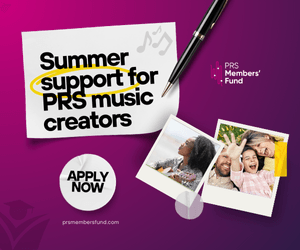
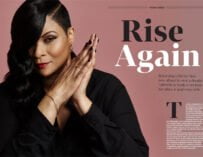


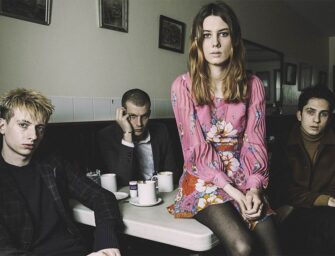
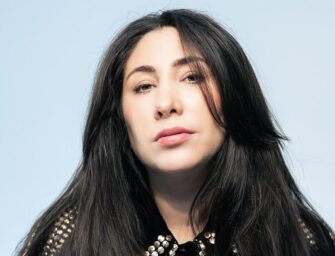
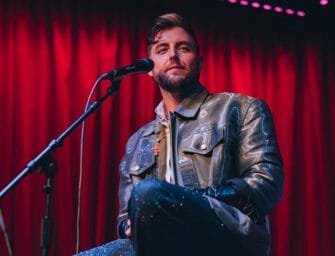
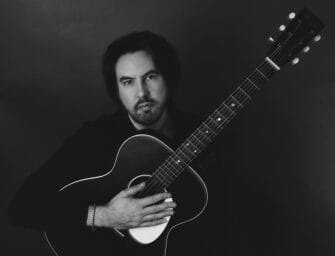
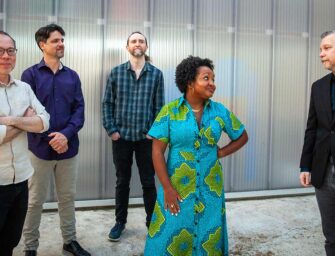























Related Articles